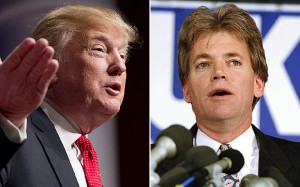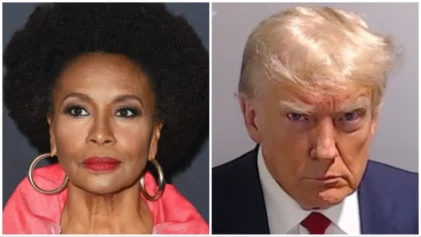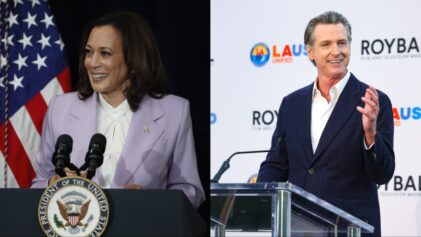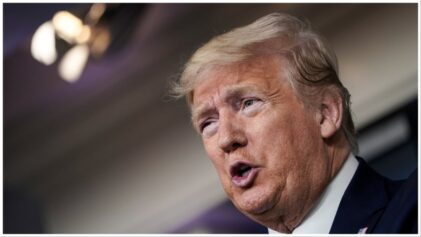
Former KKK leader David Duke, right, has come out in defense of Donald Trump Photo: AP
While Black leaders often are made to repudiate other Black leaders for making statements deemed offensive to white people, rarely are white leaders forced to condemn white people and organizations with a proven track record of destruction against Black people. A case in point: Republican presidential candidate Donald Trump and the Ku Klux Klan.
For African-Americans in particular, the Ku Klux Klan holds a special significance as ISIS for Black folks, America’s preeminent, homegrown, domestic terrorist organization. The Southern Poverty Law Center says the Klan “with its long history of violence, is the most infamous — and oldest — of American hate groups. Although Black Americans have typically been the Klan’s primary target, it also has attacked Jews, immigrants, gays and lesbians and, until recently, Catholics.”
The group began in the Reconstruction era in 1865, following the Civil War, to intimidate and terrorize Black people. “Lynchings, tar-and-featherings, rapes and other violent attacks on those challenging white supremacy became a hallmark of the Klan,” according to the SPLC. Typically, the KKK has viewed itself as a Christian organization, SPLC notes, though in modern times the group has been driven by numerous political and religious doctrines.
Meanwhile, David Duke, the white supremacist leader and former Klan Grand Wizard, has taken a liking to Donald Trump, and, like other white domestic terror groups, has endorsed the presidential candidate.
“Voting for these people, voting against Donald Trump at this point, is really treason to your heritage,” Duke said on the David Duke Radio Program, as Politico reported. “I’m not saying I endorse everything about Trump. In fact, I haven’t formally endorsed him. But I do support his candidacy, and I support voting for him as a strategic action. I hope he does everything we hope he will do.”
Duke, who is also a former Louisiana representative, told his listeners to volunteer for Trump.
“And I am telling you that it is your job now to get active. Get off your duff. Get off your rear end that’s getting fatter and fatter for many of you everyday on your chairs. When this show’s over, go out, call the Republican Party, but call Donald Trump’s headquarters, volunteer,” he said. “They’re screaming for volunteers. Go in there. You’re gonna meet people who are going to have the same kind of mindset that you have.”
According to Duke, Trump allows white Americans to be more open about their racial hatred.
“He’s made it OK to talk about these incredible concerns of European Americans today, because I think European Americans know they are the only group that can’t defend their own essential interests and their point of view,” Duke said. “He’s meant a lot for the human rights of European Americans.”
And now, with an opportunity to condemn Duke and the Klan in general, Donald Trump refused to take the bait. The Anti-Defamation League called on Trump to publicly condemn white supremacist groups and their racism, as Raw Story reported. But when Jake Tapper confronted him with the issue on CNN, Trump said he needed to do some “research,” as if the Ku Klux Klan is an obscure, unknown entity, rather than the 150-year old white Christian terrorist group that it is.
“I don’t know anything about David Duke,” Trump declared. “I don’t know anything about what you are even talking about with white supremacy or white supremacists. So, I don’t know. I mean, did he endorse me or what’s going on?”
“Because I know nothing about David Duke, I know nothing about white supremacists,” he claimed. “And so, you are asking me a question that I’m supposed to be talking about people that I know nothing about.”
“Would you just say, unequivocally, you condemn them and you don’t want their support?” Tapper asked.
“Well, I have to look at the group,” replied Trump. The conversation proceeded as follows:
Trump: I don’t know what group you’re talking about. You wouldn’t want me to condemn a group that I know nothing about. … If you would send me a list of the groups, I will do research on them and certainly I would disavow them if I thought there was something wrong.
Tapper: The Ku Klux Klan?
Trump: You may have groups in there that are totally fine and it would be very unfair. So give me a list of the groups and I’ll let you know.
Tapper: I’m just talking about David Duke and the Ku Klux Klan here.
Trump: Honestly, I don’t know David Duke. I don’t believe I’ve ever met him. I’m pretty sure I didn’t meet him, and I just don’t know anything about him.
Later, Trump tweeted the following:
As I stated at the press conference on Friday regarding David Duke- I disavow. pic.twitter.com/OIXFKPUlz2
— Donald J. Trump (@realDonaldTrump) February 28, 2016
However, as NPR reported, Trump did not always profess ignorance of Duke or the KKK. In 2000, when he ended his presidential run, Trump cited Duke’s participation in the Reform Party as a reason he no longer sought the party’s nomination.
“The Reform Party now includes a Klansman, Mr. Duke, a neo-Nazi, Mr. [Pat][ Buchanan, and a communist, Ms. [Lenora] Fulani. This is not company I wish to keep,” he wrote.
Also, on Sunday, on NBC’s Meet the Press, Trump refused to distance himself from a Benito Mussolini quote that he had retweeted.
As Yoni Appelbaum wrote in The Atlantic, the Klan was three types of organizations: It was a terrorist group, and was also active in the civil rights era, which led to David Duke and present-day manifestations of the Klan. However, it was also something else.
“In the 1920s, it enrolled millions of members, crusading for the restoration of a white, Christian, Protestant America — targeting Catholics and Jews as well as blacks, and enjoying particular popularity in the lower Midwest,” Appelbaum noted, drawing parallels with the rhetoric of today’s presidential campaign, “the anxiety about immigration; the fear that white, Protestant culture is being displaced; the rallying around patriotic symbols; the appeals to a mythic past.”
President Obama repudiated Minister Louis Farrakhan when he ran for office. The Nation of Islam leader, who was criticized for making anti-Semitic remarks, had endorsed Obama the presidential candidate.
“I have been very clear in my denunciation” of Farrakhan’s statements, Obama said in February 2008, according to the Wall Street Journal, “I did not solicit his support.”
Obama added that he “can not censor” individual endorsements but said there was no affiliation between his campaign and Farrakhan.
“I can’t say to somebody that he can’t say that he thinks I’m a good guy,” Obama said, noting his support among Jewish Americans. “I have some of the strongest support from the Jewish community in my hometown of Chicago and in this campaign,” he added, calling himself a “stalwart” on support for Israel.
Meanwhile, Sen. Hillary Clinton, Obama’s rival at the time, suggested Obama’s comments were insufficient.
“There’s a difference between denouncing and rejecting,” Clinton offered, “And I made it very clear that I did not want their support, I rejected it,” she said, “I would not be associated with people” that make such comments.
Obama quickly responded. “I’m happy to concede the point and I would reject and denounce,” he said.
“Good, good,” replied Clinton.
Why couldn’t Donald Trump repudiate David Duke and the racist, domestic terror organization known as the Ku Klux Klan? Why should he not be made to condemn them? Is it because Trump agrees with the Klan? Is there anything else to discuss?


